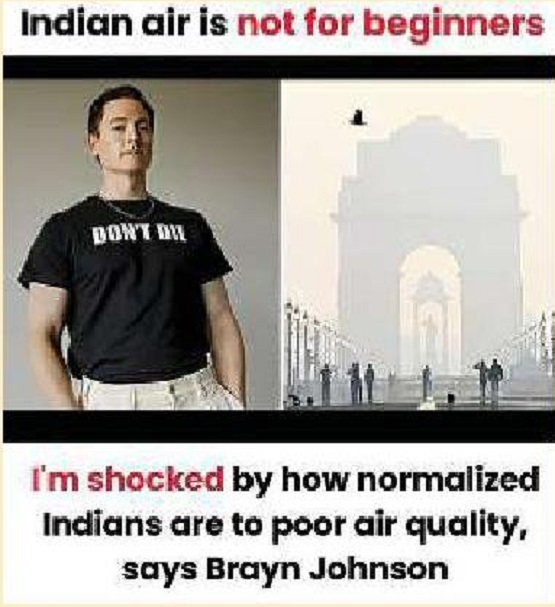Of the polluting normal
| Date :12-Feb-2025 |

By Biraj Dixit :
“Air pollution has been so normalised in India that
no one even notices any more despite the science of its
negative effects being well known.”
The anti-ageing enthusiast millionaire Bryan
Johnson’swords, after he walked out of a podcast due
to poor air quality, did provoke many. While some
thought the millionaire had given himself too much
airs, some said he had given vent to what so many
others have been feeling.
Air pollution is, no doubt, extremely dangerous,
especially when it has reached such alarming levels.
Much more detrimental, however, could be the ability to‘normalise’.Normalising thingsinvolves accepting the unacceptable and living with it. Such an
acceptance steals the one advantage that crisis can
offer –acollective readiness to take the very tough
road of ‘change’.

Let’s look into things that are now normal but
which should have been unacceptable – air pollution included. In our society, many things fit the bill,
right from corruption and the VIP culture to patriarchy and harassment, from rote in schools to rat
race for jobs, from irresponsible social behaviour to
growing human indifference, the list of ‘chalta hai…’
things is large and growing.
Had we refused to grant these things the dignity of
normalcyletting themremainunacceptable, thenperhaps they might have not achieved this acceptance
that we are forced to give them today. This despite
knowing fully well how detrimental they can be to
our existence.
At the heart of this acceptance is the lethargy to
visualise things in totality, to walk the talk, to remain
completelyinvestedin thepromise of life. Take for example the
case of corruption. It isabad
thing. Everyone knows that for
sure. Some one described it as
the parasite which weakens the fabric of a nation.
Some, more experienced, call it a necessary evil.
Answer to whyitis called‘necessary’is hidden somewhere between the many ifs and buts offered to justify it.‘We do not want to, but what is the option…???’
is the common refrain.
So, in the wider perception
of things, we are honest but…the world in which we
live is not and so we cannot be honest. Common
sense says, ‘In Rome, do as Romans do.’ Sometimes,
common sense of the present eats up the wisdom of
ages. We survive the day, but lose the years. So easily, we make evil necessary. So easily, evil gets normalised.Corruption goes against the very grain of all
our belief systems, all ourreligious principles, all ethical codes and yet it is to be practised since everyone
is practising it.
Ditto with patriarchy, we were born into. The earliest examplesofman-womancompanionship,inhistory of the Indian sub-continent, showed remarkableappreciation,respectandunderstandingbetween
the two genders. Someone came up with the idea
that women were born to serve men. And though
most wise men of the land beautifully upheld the
similarities and differences of the sexes, never to
undermine one in favour of the other, in course of
time common sense or the sense of the most common people took over. So, the ‘purdahs’ and the
‘johars’ came to protect women’s honour.
The easier way to protect her could have as well been to give
her a sword and train her to protect herself, her honour and her nation as well! But the bright individuals of the ‘common-sense brigade’ did not see the
strength of women and saw only her weakness. So,
despite the fact thatineverychapterofhistory,women
-- strong, clever and revolting -- have found mention, womenin toto became not the equal or unequal
butlowerin stature andstatus.Andwhen this thought
wasnormalisedin thesociety,prideinholdingadaughter changed into a burden so much that daughters
were and are being killedin themother’swombitself.
Similar is the case of our centre of learning today.
The idea behind sending children into school is to
carefully chisel a child into making him or her a
strong, courageous, aware, clever and wise human
being in control of himself/herself and his/her surroundings and willing to explore his/her own genius
and that of the nature around
him/her.
After running into
manycommon-heldbeliefsand
normalisations, it has come to
suchalowthatourchildren,who
were made to mug up the knowledge of the entire
world, are now fearing that some AI, having a greater
memory,willmake themredundantin theworld!They
fear they will have no jobs to do. That again is a overnormalised approach. For in fact, they will have a lot
on their hands. They will haveahuge job to fix a devastated world which we will, with our normalised
conditioning, leave for them. And now for the vexed issue of air pollution. Have
we normalised pollution? Well, AQIs of cities after
cities fall in the red but are not red enough to make
us see red. That shows how normalised air pollution
is. We know progress and pure air do not go handin-hand. Many countries like Singapore and South
Korea might have set examples of how it could be
done. But they also do not fall into the trap of normalisation. They are not as resilient as we, nor are
they as accepting.
Perhaps the trick for us is to be less accepting and
less normalising. If our air is toxic, we must feel it,
cry hoarse about it, and see that it changes for good.
Air pollution is a crisis. Let us not rob ourselves of
the one chance to change.
This time round, let us ignore the insult. Let us not
normalise it so that many more enthusiasts of long
life run away from our shows. The best thing would
be to give ourselves some time, perhaps a decade
and then invite Mr Bryan Johnson again telling him
that if he is eyeing longevity and anti-ageing, this is
the place he ought to be. For it has much more than
just pure air. It has a rich spiritual heritage which can
also help him see maturity, life and death in a
different way.
